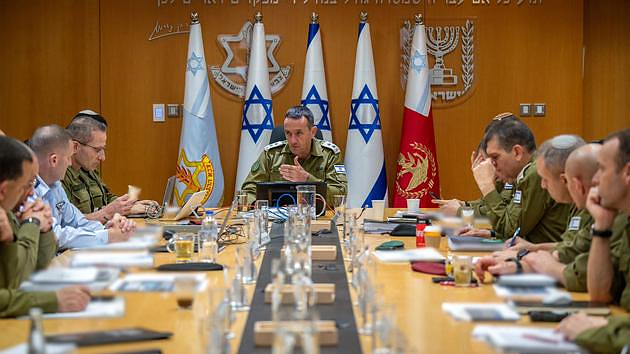In Tel Aviv
“Ultimately will the IDF strike in Iran or not?”: this question was launched on Monday almost in the form of a joke by Israeli army radio without a clear answer being given. The War Cabinet met on Monday for the second time since the Iranian missile and drone attack to resolve this question: a difficult mission as Israeli leaders are divided. Some officials advocate massive reprisals such as the chief of staff of the Israeli army, Herzi Halevi, who on Monday promised a “response” to a clear aggression, if only to restore the power of deterrence of the Hebrew State.
Other members of the government believe that it is better to wait so as not to lose the very broad international support which contrasts sharply with the almost total diplomatic isolation in which Benyamin Netanyahu's government found itself before the Iranian attack due to its management of the war in the Gaza Strip and the humanitarian crisis plaguing the Palestinian enclave.
From the outside, pressure from Joe Biden is being felt hard. The American president pushed Benjamin Netanyahu to “think carefully” before embarking on a military adventure likely to degenerate into a regional war. France and Great Britain have also given full support to Israel, albeit with a call for moderation. In other words, Israel should be satisfied with having scored a victory by having intercepted 99% of the missiles and drones fired for the first time directly from Iranian territory on Saturday night.
The leaders of two far-right parties, Bezalel Smotrich, Minister of Finance, and Itamar Ben Gvir, Minister of National Security in charge of the police, stepped up to demand massive reprisals. “Restraint and moderation resulted in October 7, which is why Israel must reimpose its power of deterrence, including a little madness,” explained Itamar Ben Gvir. Army officials, according to media reports, are also in favor of a full-blown attack on Iran. But as Nadav Eyal points out in the daily Yedioth Ahronoth, military intelligence, which was taken completely by surprise on October 7 during the massacres committed by Hamas in southern Israel, once again made an error of assessment in failing to anticipate the violence of Iran's unprecedented response to the targeted killing of a senior Iranian Revolutionary Guard official on April 1 in Damascus in an air raid attributed to Israel.
Pulled from all sides Benyamin Netanyahu seems to be hesitating. Several commentators believe that Iranian aggression offers an unexpected opportunity to form an alliance between the United States, the Gulf countries in particular Saudi Arabia and Jordan, whose air force has shot down several missiles and drones, who were heading towards Israeli territory. This coalition supported by European countries would be able to impose “crippling” sanctions to hinder the Iranian nuclear program that Benjamin Netanyahu has presented for years as the most serious threat to the very existence of the State of Israel. But the Prime Minister could still want to fight it out immediately, according to American sources.
The only certainty: on the military level, the Israeli army already has a lot to do with the continuation of the war in the Gaza Strip and the preparations for an invasion of the town of Rafah near the Egyptian border, considered to be the last bastion of Hamas, but where more than 1 million Palestinians who fled the fighting are refugees. Clashes also continue with Hezbollah, Tehran's ally, on the northern border with Lebanon.
Also read: Missile and drone attack against Israel: an Iranian military failure?
The military has also not renounced air raids in Syria against Iranian officers stationed there or deliveries of Iranian weapons to Hezbollah. Tension also rose in the West Bank following the killing of a 14-year-old Israeli boy near an Israeli settlement on Friday.
In Israel, on the other hand, it is time to return to normal. All educational activities that were suspended on Sunday have resumed. Likewise, the ban on gatherings of more than a thousand people, including demonstrations for security reasons, was lifted while international air traffic suspended for seven hours on Sunday resumed.

 B:SM will break its investment record this year with 62 million euros
B:SM will break its investment record this year with 62 million euros War in Ukraine: when kyiv attacks Russia with inflatable balloons loaded with explosives
War in Ukraine: when kyiv attacks Russia with inflatable balloons loaded with explosives United States: divided on the question of presidential immunity, the Supreme Court offers respite to Trump
United States: divided on the question of presidential immunity, the Supreme Court offers respite to Trump Maurizio Molinari: “the Scurati affair, a European injury”
Maurizio Molinari: “the Scurati affair, a European injury” Inflation rises to 3.3% in April and core inflation moderates to 2.9%
Inflation rises to 3.3% in April and core inflation moderates to 2.9% Pedro Sánchez announces that he continues "with more strength" as president of the Government
Pedro Sánchez announces that he continues "with more strength" as president of the Government Irritable bowel syndrome: the effectiveness of low-carbohydrate diets is confirmed
Irritable bowel syndrome: the effectiveness of low-carbohydrate diets is confirmed Beware of the three main sources of poisoning in children
Beware of the three main sources of poisoning in children Relief at Bercy: Moody’s does not sanction France
Relief at Bercy: Moody’s does not sanction France More than 10 million holders, 100 billion euros: the Retirement Savings Plan is a hit
More than 10 million holders, 100 billion euros: the Retirement Savings Plan is a hit Paris 2024 Olympic Games: the extension of line 14 will open “at the end of June”, confirms Valérie Pécresse
Paris 2024 Olympic Games: the extension of line 14 will open “at the end of June”, confirms Valérie Pécresse Failing ventilators: Philips to pay $1.1 billion after complaints in the United States
Failing ventilators: Philips to pay $1.1 billion after complaints in the United States The Cannes Film Festival welcomes Omar Sy, Eva Green and Kore-Eda to its jury
The Cannes Film Festival welcomes Omar Sy, Eva Green and Kore-Eda to its jury Prisoner in Israel, a Palestinian receives the International Prize for Arab Fiction
Prisoner in Israel, a Palestinian receives the International Prize for Arab Fiction Harvey Weinstein, the former American producer hospitalized in New York
Harvey Weinstein, the former American producer hospitalized in New York New success for Zendaya, tops the North American box office with Challengers
New success for Zendaya, tops the North American box office with Challengers Skoda Kodiaq 2024: a 'beast' plug-in hybrid SUV
Skoda Kodiaq 2024: a 'beast' plug-in hybrid SUV Tesla launches a new Model Y with 600 km of autonomy at a "more accessible price"
Tesla launches a new Model Y with 600 km of autonomy at a "more accessible price" The 10 best-selling cars in March 2024 in Spain: sales fall due to Easter
The 10 best-selling cars in March 2024 in Spain: sales fall due to Easter A private jet company buys more than 100 flying cars
A private jet company buys more than 100 flying cars This is how housing prices have changed in Spain in the last decade
This is how housing prices have changed in Spain in the last decade The home mortgage firm drops 10% in January and interest soars to 3.46%
The home mortgage firm drops 10% in January and interest soars to 3.46% The jewel of the Rocío de Nagüeles urbanization: a dream villa in Marbella
The jewel of the Rocío de Nagüeles urbanization: a dream villa in Marbella Rental prices grow by 7.3% in February: where does it go up and where does it go down?
Rental prices grow by 7.3% in February: where does it go up and where does it go down? Europeans: a senior official on the National Rally list
Europeans: a senior official on the National Rally list Blockade of Sciences Po: the right denounces a “drift”, the government charges the rebels
Blockade of Sciences Po: the right denounces a “drift”, the government charges the rebels Even on a mission for NATO, the Charles-de-Gaulle remains under French control, Lecornu responds to Mélenchon
Even on a mission for NATO, the Charles-de-Gaulle remains under French control, Lecornu responds to Mélenchon “Deadly Europe”, “economic decline”, immigration… What to remember from Emmanuel Macron’s speech at the Sorbonne
“Deadly Europe”, “economic decline”, immigration… What to remember from Emmanuel Macron’s speech at the Sorbonne These French cities that will boycott the World Cup in Qatar
These French cities that will boycott the World Cup in Qatar NBA: young Thunder coach Mark Daigneault named coach of the year
NBA: young Thunder coach Mark Daigneault named coach of the year Athletics: Noah Lyles in legs in Bermuda
Athletics: Noah Lyles in legs in Bermuda Serie A: Dumfries celebrates Inter Milan title with humiliating sign towards Hernandez
Serie A: Dumfries celebrates Inter Milan title with humiliating sign towards Hernandez Tennis: no pity for Sorribes, Swiatek is in the quarterfinals in Madrid
Tennis: no pity for Sorribes, Swiatek is in the quarterfinals in Madrid

















